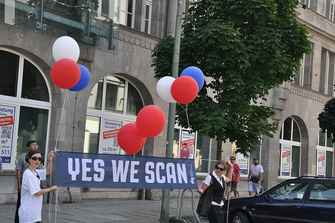
It’s one thing for the average angry person to go off on a long, grammatically incorrect, misspelled screed. I get a few of those in the mail from time to time, and I rarely have any interest beyond the first paragraph or two.
| | It’s quite another, however, to read a well-reasoned, well-written rant. U.S. District Judge Richard Leon’s 68-page ruling against the National Security Agency and the way it collects data on your phone calls is a page-turner. (Read the decision here.) It certainly isn’t the definitive last-word on the subject, however, which is too bad. Five people had sued, challenging the way the NSA gathers massive amounts of data on every phone call in the nation, including theirs. They probably couldn’t have imagined a better outcome. Invoking the founding fathers, the judge wrote, “Indeed, I have little doubt that the author of our Constitution, James Madison, who cautioned us to beware ‘the abridgement of freedom of the people by gradual and silent encroachments by those in power,’ would be aghast.” Worse yet for the government, Judge Leon called into question the entire premise behind collecting such data, which is that it is necessary in order to wage a successful war against terrorists. Oh yeah, he said, show us. “…the government does not cite a single instance in which analysis of the NSA’s bulk metadata collection actually stopped an imminent attack, or otherwise aided the government in achieving any objective that was time-sensitive in nature,” he wrote. The government cited a 1979 case out of Maryland to justify the gathering of telephone metadata to thwart crime. Judge Leon invited everyone to look around them. We’re not in 1979 any more, Toto. “Count the phones at the bus stop, in a restaurant, or around the table at a work meeting or any given occasion,” he wrote. “Thirty-four years ago, none of those phones would have been there. Thirty-four years ago, city streets were lined with pay phones. Thirty-four years ago, when people wanted to send ‘text messages,’ they wrote letters and attached postage stamps.” The time has come to find that 1979 case outdated and inapplicable. If police occasionally need telephone information to help them keep the peace, that’s fine; but only occasionally (and, one presumes, with a warrant). “It’s one thing to say that people expect phone companies to occasionally provide information to law enforcement; it is quite another to suggest that our citizens expect all phone companies to operate what is effectively a join intelligence-gathering operation with the government,” he wrote. The question now is, what good will Judge Leon’s ruling do? Probably very little. Most of the experts quoted in media stories said the ruling is likely to be overturned on appeal, and that it stands as virtually the only ruling against such data-gathering. Others liken the gathering of metadata from your phone as the same thing as examining DMV records or other public documents. Still, it was a fun read. |

 RSS Feed
RSS Feed

